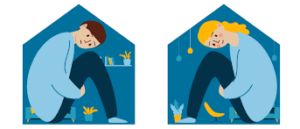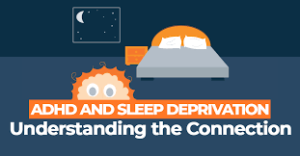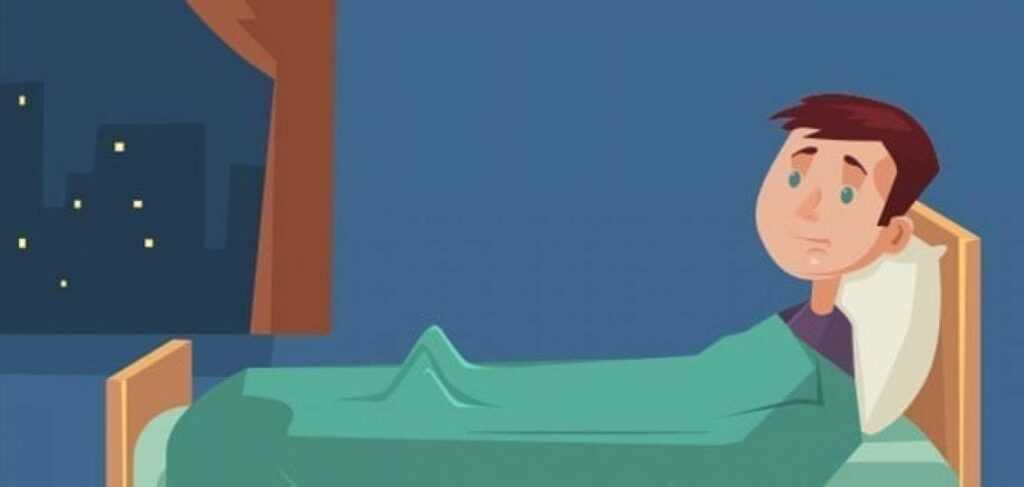Do you have trouble sleeping at night? Do you feel like you can never get enough rest? If so, you may be suffering from a sleep disorder. One of the most common sleep disorders is ADHD. In this blog post, we will explore the link between ADHD and sleep problems. We will discuss the symptoms of each and how to get the best sleep possible!
Contents
Understanding ADHD

ADHD is a mental disorder that can cause problems with focus, hyperactivity, and impulsiveness. People with ADHD may also have difficulty sleeping. Studies have shown that there is a link between ADHD and sleep problems.
There are many different types of sleep disorders, but the most common type of sleep disorder among people with ADHD is insomnia. Insomnia is a sleep disorder that makes it difficult to fall asleep or stay asleep. People with insomnia may have trouble falling asleep, staying asleep, or both.
Connection Between ADHD And Sleep Problems

There are many children who have both ADHD and sleep problems. In fact, studies have shown that 50-70% of children with ADHD also have a sleep disorder. The most common sleep disorders in children with ADHD are insomnia, sleep apnea, and restless legs syndrome.
There are several reasons why ADHD and sleep problems are so closely linked. One reason is that ADHD can make it difficult for children to fall asleep and stay asleep. Children with ADHD may have trouble winding down at night because their minds are still racing from the day’s activities. Additionally, children with ADHD may be more likely to have sleep problems because of other conditions that are often comorbid with ADHD, such as anxiety and depression.
The link between ADHD and sleep problems is bidirectional, meaning that not only can ADHD lead to sleep problems, but sleep problems can also worsen ADHD symptoms. Sleep deprivation can cause irritability, impulsivity, and inattention, which are all hallmark symptoms of ADHD. Furthermore, research has shown that treating sleep problems can improve ADHD symptoms. If your child has both ADHD and sleep problems, it is important to talk to your child’s doctor about treatment options.
What Are The Most Common ADHD Sleep Problems?

The most common sleep problems for people with ADHD are:
Trouble falling asleep: It can take people with ADHD a long time to fall asleep at night. This is because their minds are often still racing from the day’s events.
People with ADHD may wake up frequently during the night or early in the morning. This can be due to anxiety or restlessness.
Staying asleep: People with ADHD may have trouble staying asleep at night. They may be restless and have difficulty falling asleep. A person with ADHD may have difficulty falling asleep or staying asleep. People with ADHD may wake up frequently during the night. This can make it difficult to get a good night’s sleep.
Early waking: People with ADHD often wake up earlier than they would like. This can be due to an overactive mind or difficulty falling asleep.
Nightmares: People with ADHD may experience nightmares more often than others. Nightmares can be caused by stress, anxiety, or medications used to treat ADHD.
Excessive daytime sleepiness: A person with ADHD may feel excessively sleepy during the day. This is often due to poor sleep at night. For instance, a person with ADHD may have difficulty falling asleep or staying asleep. They may also have sleepwalked.
Restless legs syndrome: A person with ADHD may experience restless legs syndrome (RLS). This is a condition that causes an urge to move the legs. RLS can make it difficult to fall asleep and stay asleep.
Sleep apnea: A person with ADHD may have sleep apnea, which is a condition that causes interrupted breathing during sleep. Sleep apnea can make it difficult to get enough restful sleep.
All of these can lead to major problems in everyday life, including poor school or work performance, accidents, and relationship difficulties.
What Are the Causes of Sleeping Problems in People with ADHD?
There are many potential causes of sleeping problems in people with ADHD. This include:
The mind is always thinking
One possibility is that the person has difficulty falling asleep because their mind is racing. They may be thinking about all the things they have to do or worrying about something that happened during the day. For instance, they may be replaying a conversation in their head or thinking about an upcoming test.
Poor sleep habits
Another possibility is that the person has poor sleep habits. This means they are not following healthy sleep hygiene practices. For example, they may go to bed at different times each night or use their phone or TV in bed. These behaviors can make it difficult to fall asleep and stay asleep.
Medical conditions
There are also medical conditions that can cause sleeping problems. For instance, people with ADHD may have anxiety or depression. These conditions can make it difficult to fall asleep and stay asleep. Additionally, people with ADHD may have sleep apnea, which is a condition that causes pauses in breathing during sleep. This can make it difficult to get a restful night’s sleep.
Aroused by noise
Another possibility is that the person has trouble staying asleep because they are easily aroused by noise or movement. This can be a problem if the person lives in a chaotic or noisy environment. Or, the person may have an underlying medical condition that makes it difficult to stay asleep.
Unable to stick to a sleep schedule
Lastly, people with ADHD may have difficulty getting enough sleep because they are unable to stick to a regular sleep schedule. This is often due to their impulsivity and difficulty following through on tasks.
So these are the causes of sleeping problems in people with ADHD. If you have any of these problems, it is important to talk to your doctor so they can help you find a solution
Consequences
There are many potential consequences of sleep problems in people with ADHD.
- One is that the person may have difficulty concentrating and focusing during the day. This can impact their ability to perform well at work or school.
- Sleep problems can also make it difficult for people with ADHD to concentrate and focus on tasks. They may have difficulty completing tasks, and their work may suffer as a result. In addition, sleep problems can lead to moodiness and irritability.
- Additionally, sleep problems can lead to moodiness and irritability. This can make it difficult for the person to maintain positive relationships with family and friends.
- Lastly, sleep deprivation can cause physical health problems such as headaches, fatigue, and weight gain.
- They may also have irregular sleep patterns, waking up frequently during the night. These sleep problems can lead to fatigue and drowsiness during the day.
If you think you may have ADHD, it is important to talk to your doctor. They will be able to help you determine if you have the disorder and what treatment options are available to you. Treating ADHD can help reduce or eliminate many of the symptoms associated with the disorder, including sleep.
How Do You Manage Sleep Problems With ADHD?
There are a few things you can do to help manage sleep problems with ADHD.
Diet
There is no specific diet that people with ADHD should follow. However, eating healthy foods and avoiding processed foods can help improve symptoms. Eating a balanced diet with plenty of fruits, vegetables, and whole grains is always a good idea.The diet must be healthy, nutritious and complete.
Exercise
Another thing that can help is to get regular exercise. Exercise can help improve sleep quality by reducing stress and fatigue. It is best to avoid exercising too close to bedtime, however, as this can actually make it harder to fall asleep. Doing regular exercise can make you more active.
Sleep
Sleep hygiene is a set of habits that can help people get better sleep. This includes things like avoiding caffeine before bed and creating a relaxing bedtime routine. People with ADHD may benefit from sleep hygiene education and training.First, it is important to establish a regular sleep schedule and stick to it as much as possible. This means going to bed at the same time each night and getting up at the same time each morning.
There are also some specific things that people with ADHD can do to improve their sleep. One is to limit screen time before bed. This means no TV, computer, or phone use in the hour before sleep.
Seek professional help: If you’re struggling with ADHD and sleep problems, it may be time to seek professional help. A therapist or counselor can provide support and guidance. They can also offer coping and problem-solving strategies specifically for ADHD.
There are many ways to treat ADHD, but not all of them involve medication. Some people with ADHD may benefit from behavioral therapy, which can help teach people how to better manage their symptoms. Others may need medication to control their symptoms.
Cognitive behavioral therapy for insomnia (CBT-I)
CBT-I is a type of therapy that helps people change their thoughts and behaviors around sleep. It can help people with ADHD learn how to better manage their sleep.
Medication
There are many medications that can help with ADHD. Some of these medications, such as Adderall and Ritalin, can also help with sleep problems. If you’re taking medication for ADHD, talk to your doctor about any potential side effects or interactions with other medications.
Stimulant medication: Stimulants are the most common type of medication used to treat ADHD. They can help improve focus and concentration. However, they can also make it difficult to fall asleep. If this is the case, your doctor may prescribe a lower dose to be taken in the evening.
Non-stimulant medication: Non-stimulants are another type of medication used to treat ADHD. They can help improve focus and concentration without making it difficult to sleep. Non-stimulants include medications like guanfacine and atomoxetine.
Supplements
Some people with ADHD may benefit from taking supplements. omega-Fatty acids, magnesium, and zinc are all examples of potential supplements for ADHD. However, it’s important to talk to a doctor before starting any supplement regimen.
If you have ADHD, it’s important to talk to your doctor about all of your treatment options. They can help you find the best medication for your needs. Medication is just one part of treating ADHD. Therapy, lifestyle changes, and support from family and friends can also be helpful.
Conclusion
It may be concluded that ADHD and sleep problems are linked. However, the exact nature of this relationship is not yet clear. It is possible that ADHD contributes to sleep problems, or that sleep problems contribute to ADHD. Further research is needed to elucidate the precise nature of this link. If you suspect that you or someone you know has ADHD, please speak to a doctor or mental health professional.
For further information and suggestions, please contact Therapy Mantra. We have a team of expert therapists and psychiatrists that can help you overcome this problem. Get in touch with us right away to learn more about our services. You may also make an online therapy session or download our free Android or iOS app.


